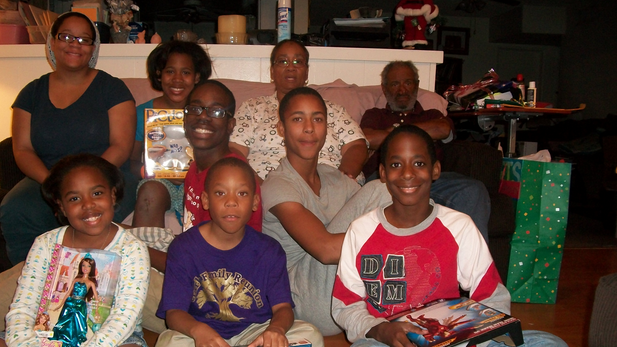 The Gray family at Christmas 2012.
The Gray family at Christmas 2012.Listen:
By Alexandra Olgin, for Arizona Public Media
Arizona has record numbers of children in foster care – at last count, more than 17-thousand - and that has put a strain on the system of finding foster homes for temporary care.
That has led many grandparents and other relatives to take in children for parents who cannot or will not care for them, and the state has provided special subsidies for such families. Now the money for the program is running out, and that could jeopardize many of the estimated 8,000 children living with relatives in foster care.
At the home of Victoria and Gentry Gray in Phoenix, dinnertime is a swarm of activity as five youngsters line up for helpings of fish sticks, corn on the cob and fried cabbage.
"Grandma's cookin,', and you're going to have to eat what grandma cooks," announces Victoria Gray, a 64-year-old rearing five of her grandchildren with her husband.
The Grays' daughter, who is mother to the five children, recently was released from prison and has struggled with addiction, Victoria Gray said. So the children are with their grandparents, which means a financial struggle.
"We have to meet budget, so we went back to work," Victoria Gray said. "So now he's 79, and now I am going to start working again. It helps to keep the budget together."
The Grays are known, officially, as "kinship caregivers." The Arizona Department of Child Safety, known as DCS, reported that last year, nearly 20 percent of the state’s kinship caregivers were older than 60.
Victoria had a knee replaced a few years ago, so she is limited in how much she can play with her grandchildren.
"I’m not jumping rope with the girls, not unless a paramedic is waiting on the curb,” she said.
Gentry Gray had just retired from his first career with the U.S. Postal Service when the grandchildren moved in. Victoria said that, at first, she was able to get a grandparent stipend from DCS of $75 a month for each child.
"My grocery bill went from $75 a week to $188," she said. "I can feed them this week. But what do I do next week? I mean we were already dipping into our savings. We were taking some chunk out of our 401(k)."
Eventually, the Grays joined the system and became licensed foster parents, meaning they were able to get nearly nine times more in monthly state aid than unlicensed kinship caregivers.
Thousands of other families don’t make that leap, and that puts family finances and the children themselves in potential jeopardy.
"These 8,000 or so children in kinship care are 8,000 or so licensed foster beds that the agency doesn’t have to locate," said DCS kinship specialist Lauri Devine.
That's good, because there aren’t enough foster families for the number of kids in the system. In the last year, DCS reports a net increase of 36 foster homes. It’s a lengthy and time-consuming process to become a licensed foster family, Devine said.
Last year, 15 percent of kinship caregivers have done so. And meanwhile, since many of the kids in unlicensed kinship care are between 3 and 5, families who are not licensed get only $19 a month per child.
That's where Arizona Kinship Support Services comes in. The program helps families get access to federal benefits such as child-care subsidies and food stamps. The kinship navigators also help relatives get through voluminous packets of legal paperwork.
Julie Treinen, program director of the group, said the legal status allows caregivers to enroll the kids in school and take them to the doctor.
Over the last three years, the kinship group has helped thousands families get additional benefits, and estimate they saved DCS millions dollars a year. Those figures are based on calculating how much the children would have cost the agency.
But the grant that funds these navigators runs out at the end of the month.
"We’ve got a couple of funding options that we are still trying to pursue," Treinen said. "We can only provide services we have the funding for."
Treinen said her group's navigation services will have to be greatly reduced if not eliminated without more funding.

By submitting your comments, you hereby give AZPM the right to post your comments and potentially use them in any other form of media operated by this institution.